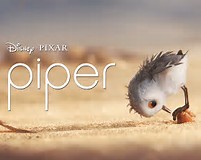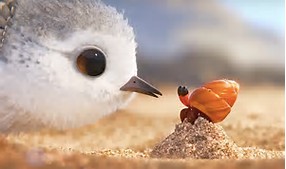
When I went to movies as a child, there was always a short film, a cartoon, or part of a serialized western before the main film. Now movies are longer and are preceded by previews of coming attractions, commercials for what the concession stand sells, and warnings to turn off your cell phone. So, when I took some of my grandchildren to last summer’s Finding Dory, I was thrilled to see a short animated feature from Pixar Studios. This year that short, Piper, won the Academy Award for Best Short. (Google it and you can see it online.)
The six-minute film with no dialogue tells the story of a baby sandpiper, a kind of bird that lives by the ocean. In the film “Piper” has come to the age where her mother begins to teach her that Mom will no longer be dropping food into her open mouth. Piper will have to hunt clams as all grown sandpipers do. But the first lesson doesn’t go well. As a wave comes in, the adult sandpipers know to run away, but Piper gets buried under it. Totally shaken, she runs for the tall seagrass of home and begs to be fed by Mom again. But Mom refuses.

Piper tries again. She follows a baby hermit crab into the shoreline and watches him burrow into the wet sand for protection right before the next wave hits. Piper copies him and this time opens her eyes underwater. There she finds what is almost a miracle. As the wave builds, she can see all the clams pop up before sinking below the surface. Now she has a mental map of where every clam is. This knowledge gives her the ability to quickly feed herself and to help others get food.
Alan Barillaro, the short’s director got the idea for Piper from his runs along the beach. He watched thousands of seabirds run from the waves but return between waves to eat. He said, “It’s always fun to show a world we’re familiar with but from a different perspective. We’ve all been to the beach, but have we ever viewed water from just an inch off the sand? That could be very fearful from a bird’s perspective.”

In its short time span, the film also took on another theme as Piper learns a lesson from an even smaller creature, the baby hermit crab. “It’s the kid at the playground feeling,” says Barillaro. “You fall down and you feel so small, but you look and see someone even smaller than you brush themselves off and tackle something, and learn from that in your own way. It was important to me to stay in the kid world and see the world from Piper’s eyes, and not from the human perspective.”
Barillaro’s film uses a young creature to teach some good lessons. Jesus also used a child as a teaching tool for His disciples. One day Jesus asked His disciples what they had been arguing about as they walked along the road. They didn’t want to tell Him because they were ashamed. Not too ashamed that they did it but ashamed for Him to know about it. But He did know. He told them they had been arguing about who among them would be the greatest in the kingdom.
It was apparently a question that came up more than once. In Matthew 18:1−3:
At that time the disciples came to Jesus and asked, “Who is the greatest in the kingdom of heaven?” He called a little child and had him stand among them. And he said: “I tell you the truth, unless you change and become like little children, you will never enter the kingdom of heaven. Therefore, whoever humbles himself like this child is the greatest in the kingdom of heaven.”
Jesus wanted to teach His disciples all He could in the three years He would be on earth with them. But, when they were busy arguing amongst themselves about who was the greatest, they weren’t able to learn anything. Their focus was on themselves. So He told them straight out “unless you change and become like little children, you will never enter the kingdom of heaven.” Why “children”? Because little children are often fascinated with what is going on around them. They are usually not self-absorbed. They only become that way as they grow older.
To become a follower of Jesus you have to be humble enough to be teachable. Warren Wiersbe points out that an unspoiled child has the characteristics that make for humility: trust, dependence, the desire to make others happy, and an absence of boasting or selfish desire to be greater than others.
In our natural state, most of us don’t have that kind of humility. Given a choice, we would rather be celebrities than servants. But to follow Jesus means to go down a different path: to put Him first and then to think of others before ourselves, as He did.
A group of children who built a small playhouse in a tree had the right idea. They decided to hang the rules for their club on the wall. After talking it over quite a bit, they narrowed it down to one rule: “Nobody act big. Nobody act small. Everybody act medium.”
©2017 by Vicki Huffman

About Vicki Huffman
National award-winning journalist Vicki Huffman's latest book is Soon to Come: The Revelation of Jesus Christ. It is a verse by verse exposition of the only purely prophetical book in the New Testament. Her other five books are: The Jesus Moses Knew: How to See Christ in the Old Testament; A Secret Hope (novel); Still Looking: Finding the Peace of God in Job Loss; Plus Living: Looking for Joy in All the Right Places, and The Best of Times. All are available in print and e-book on amazon.com. Vicki is a national award-winning author who has taught the Bible for many years. She was an editor for several Christian publishing houses, including Thomas Nelson and David C. Cook Ministries.
- Web |
- More Posts(120)

